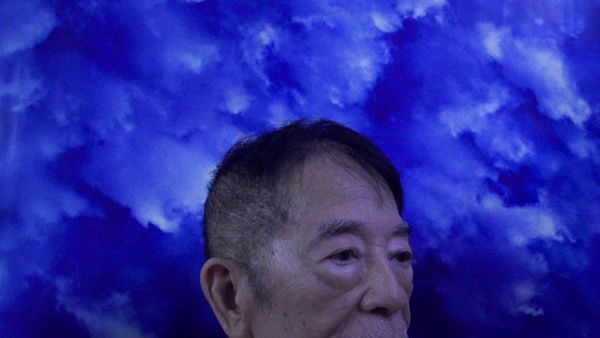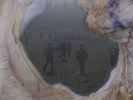Eye For Film >> Movies >> Nowhere Near (2023) Film Review
Nowhere Near
Reviewed by: Sunil Chauhan

Between a few features and multiple shorts, Filipino-American director Miko Revereza has made a mission of injecting experimental, personal cinema with the politics of migration. Distancing (2019) found poetry in the logistics of leaving the US for the Philippines, Biometrics (2019) featured only Revereza’s fingerprints on 16mm leader film to echo his experiences of being fingerprinted by DACA (Deferred Action for Childhood Arrivals) and No Data Plan (2019) was filmed across a train journey from LA to New York, a mode of transportation often targeted for random ICE (Immigration and Customs Enforcement) inspections because of its use by undocumented migrants.
Nowhere Near doesn't upend Revereza's area of interest, but finds some new ways to mine the personal, political and historical. Taken as a whole, its self-reflexive, freewheeling, glimpsing form doesn’t seem to carry any grand, overarching aim, but along the way, Revereza offers plenty of nuggets to chew on.

Opening with a quote from Roberto Bolano declaring "I had lost a country but I had won a dream" (the last word of that sentence turns out to be a sardonic pun - Revereza was once a ‘Dreamer’, named after the Development, Relief, and Education for Alien Minors aka DREAM Act, setup to grant citizenship to undocumented child migrants), the film ends up revealing that Revereza lived in the US some two decades without documentation. The reasons for this puzzle don't entirely grip him as a filmmaker however - he has less interest in investigating than creating an impressionistic portrait, with his family serving as a kind of paradigm of Filipino migrants. Their story gives him a base to muse on the Philippines' colonial history, national identity, migration fantasies and disappointments, the maze of America's immigration system, and even a reimagining of Spirited Away as a migrant story, all in fragmented bursts.
It's a lot to think about, but Nowhere Near finds its cohesion in Revereza's artful touch, tone, pace, and entrancing sense of rhythm. He knows what a beautiful shot looks like, but has a playful disinterest in polish (in later parts of the film, he draws attention to a dust particle in the corner of the screen he didn't bother removing). Nowhere Near might be "whooshy experimental stuff" as he dubs it, but it's gently, unassumingly so. It's never a difficult watch, both because of, and despite its refusal to sit with anything too long.
In the film's latter half, where he follows his family on a trip to Manila to discover what happened to their land and property, he wonders whether migration is a futile quest (a familiar lament in immigration cinema). That he doesn't quite answer this is part of the film's tease - Nowhere Near carries itself with an off-balance sense of dislocation where little feels resolved. At one point he comments that a film is made of ‘wounded’ parts that need to be brought together, but Revereza doesn't seem to want anything he presents to sit too comfortably, not unlike the lyrics (“everyone is here, but you’re nowhere near”) of the Yo La Tengo song the film gets its name from.
Reviewed on: 07 Sep 2023














